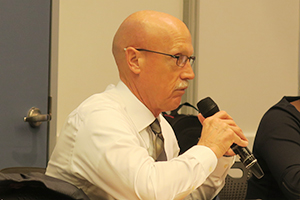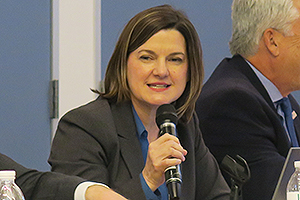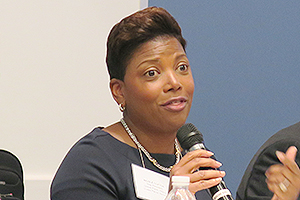Staff Reporter
Sector-Specific Messaging Key to Fighting Human Trafficking, Committee Told

WASHINGTON — Training materials on the subject of human trafficking are most effective when tailored to specific industry sectors, said Kendis Paris, executive director of Truckers Against Trafficking.
Paris’ comments March 12 marked the second public meeting of the U.S. Department of Transportation’s Advisory Committee on Human Trafficking. She serves as chairwoman of the agency’s subcommittee on training and awareness.
Various members of the transportation industry — truckers, taxi drivers, toll operators, rest stop workers and transit rail employees — need to look for different indicators when trying to spot signs of human trafficking. Paris said companies and safety agencies should therefore develop training programs that are uniquely suited to those various positions.
“Mode-specific training should be niche-specific, while public awareness campaigns should have a universal message. Specific messaging for a specific sector is key,” Paris said. “What a school bus driver’s going to see is very different from what a truck driver’s going to see.”
The Advisory Committee on Human Trafficking leads training programs and distributes education materials to various sectors of trucking, including carriers, shippers, trucking associations and commercial driver license schools. It’s goal is to develop strategies for reporting human trafficking and craft recommendations for DOT-funded programs to combat the issue.
It includes leaders of organizations that fight modern slavery, academics and representatives of the trucking, bus, rail, aviation, maritime and port industries. Its first public meeting was Dec. 6.
Paris said that the committee is still researching to gain a better understanding of how different state and local government agencies intersect with various modes of transportation.

Lorenzen by Eleanor Lamb/Transport Topics
State departments of transportation can create tools to help people who spend a lot of time on the road. The Iowa Department of Transportation’s motor vehicle enforcement chief, David Lorenzen, said the department worked with the agency’s Geographic Information System team and victim service providers to create an online map of services.
However, agencies that don’t explicitly relate to transportation can help as well. For example, Paris said departments of education can play a role in training school bus drivers on signs of trafficking.
Paris also said locations such as rest stops and terminals, as well as vehicles, can be used for awareness campaigns. For example, she said fleets could work with technology companies to equip the federally mandated electronic logging devices in trucks with targeted messaging that briefs truckers any time they park.
“I think really important partnerships would need to be secured,” Paris said.

Joyner by Eleanor Lamb/Transport Topics
Successful training requires the enthusiasm of leaders, said several members of the committee. Kristen Joyner, executive director of the South West Transit Association, used an example of an unsuccessful training program involving 200 bus drivers who operated in an area that was preparing for a Super Bowl. None of the bus drivers’ managers showed up for the training.
“It was incredibly frustrating because the operators see what’s going on, they want to react, but there was no leadership in the room,” said Joyner, chair of the group’s subcommittee on protocols and policy. “Many walked away saying, ‘There’s nothing we can do.’ They have to be on board.”

Clifton by Eleanor Lamb/Transport Topics
Nicole Clifton, vice president of global public affairs for UPS Inc., said fleet executives who share best practices about preventing human trafficking can generate more interest in the subject through socialization and initiatives.
“When you illustrate and can tell a story and have the drivers on board, it’s really impactful,” said Clifton, who serves as chair of the group’s subcommittee on research, analysis and information sharing.
Traffickers take advantage of a large influx of people, like those attending a Super Bowl, to solicit illegal services. Gregory Nevano, assistant director of U.S. Immigration and Customs Enforcement’s Homeland Security Investigations, said that his team found 1,560 potential clients through undercover ads targeting people who responded to traffickers’ solicitations during the 2018 Super Bowl in Minneapolis.
The 15-person committee will have several more meetings before submitting recommendations to DOT by July 3.
Paris recommended that the final report, which will be made public, contain one-page guides containing information specific to each mode of transportation.

